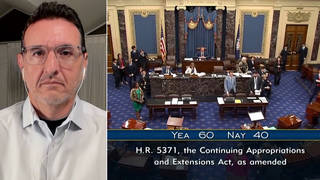
The Trump administration has announced plans to gut the Endangered Species Act, ordering federal agencies to consider economic impacts before listing animals to be protected under the law. The newly proposed guidelines by the Interior Department would allow corporations involved in mining, drilling or other forms of extraction to proceed with projects that would otherwise be prohibited. The Trump administration’s proposed rules are among several recent attacks endangering the Endangered Species Act. Earlier this month, the Congressional Western Caucus introduced a package of nine bills to “modernize” the ESA. In introducing the legislation, Republican Congressmember Don Young of Alaska said, “The Endangered Species Act has been weaponized and misused by environmental groups for too long.” We speak to Kierán Suckling, executive director and a founder of the Center for Biological Diversity.
Transcript
JUAN GONZÁLEZ: The Trump administration has announced plans to gut the Endangered Species Act, ordering federal agencies to consider economic impacts before listing animals to be protected under the law. The newly proposed guidelines by the Interior Department would allow corporations involved in mining, drilling or other forms of extraction to proceed with projects that would otherwise be prohibited.
Republican President Richard Nixon signed the Endangered Species Act in 1973 to provide a framework to conserve and protect endangered and threatened species and their habitats. The Trump administration’s proposed rules are among several recent efforts to weaken the Endangered Species Act.
Earlier this month, the Congressional Western Caucus introduced a package of nine bills to, quote, “modernize” the ESA. In introducing the legislation, Republican Congressman Don Young of Alaska said, quote, “The Endangered Species Act has been weaponized and misused by environmental groups for too long.” Meanwhile, in the Senate, Wyoming Republican John Barrasso, chairman of the Senate Committee on Environment and Public Works, also introduced a draft bill to amend the act. This is Barrasso speaking at a hearing last week.
SEN. JOHN BARRASSO: Congress last reauthorized the Endangered Species Act with amendments of substance in 1988, 30 years ago. Even the U.S. Constitution has been amended more recently than the Endangered Species Act. Stakeholders are making it clear that the Endangered Species Act can be improved. A major goal of the Endangered Species Act is the recovery of species to the point that protection under the statute is no longer necessary. Since the ESA was signed into law, only 54 out of 2,393 species listed in the U.S. and foreign countries have been delisted because they have recovered. That’s less than 3 percent. Now, as a doctor, if I admit a hundred patients to the hospital and only three recover enough under my treatment to be discharged, Governor, I would deserve to lose my medical license with numbers like that.
AMY GOODMAN: House Democrats, along with conservationists, managed to get excluded from Congress’s annual defense spending bill policies that would restrict Endangered Species Act protections for certain animals.
For more, we’re joined by Kierán Suckling. He is executive director, a founder of the Center for Biological Diversity, the group that has sued the Trump administration 81 times over the past year and a half.
Kierán, welcome to Democracy Now! Talk about what is happening to the Endangered Species Act, 45 years after it was passed and President Nixon signed off on it.
KIERÁN SUCKLING: Yeah, the Trump administration’s proposal to gut the Endangered Species Act is the most comprehensive, devastating attempt to destroy this law we’ve seen in this entire time. And this is after Reagan and after the Bushes. It’s even worse than that. It’s quite extraordinary.
JUAN GONZÁLEZ: Well, and specifically, how would the weakening or gutting of the act work, if it went through?
KIERÁN SUCKLING: Well, it will strip protection entirely for about 60 percent of all species on the list. And these are the species that are listed as threatened rather than endangered. Currently, they get essentially the same protection as endangered species. Under the Trump proposal, they would get no protection at all. You could continue to kill them, you could continue to destroy their habitat, as if they were simply not protected.
JUAN GONZÁLEZ: And how would this issue of taking into account economic impacts work?
KIERÁN SUCKLING: Yeah, this is really disastrous. The Endangered Species Act is incredibly successful because it requires that all decisions be made solely on the best available science—no politics, no economic concerns. The Trump administration now wants to say, when deciding whether a species is endangered—a scientific question—you’re going to have to take into account economic impacts. Well, economic activity—mining, logging, grazing—is the cause of endangerment. And this is the Endangered Species Act, not the Endangered Mining Industry Act. So it really turns the priority of this very successful law entirely upside down.
AMY GOODMAN: I want to turn to Richard Nixon, speaking in 1970, when he outlined a sweeping plan to protect the environment. Three years later, he signed the Endangered Species Act.
PRESIDENT RICHARD NIXON: The great question of the ’70s is: Shall we surrender to our surroundings, or shall we make our peace with nature and begin to make reparations for the damage we have done to our air, to our land and to our water?
AMY GOODMAN: So that’s Richard Nixon speaking back in the 1970s. I want to go back to Republican Senator John Barrasso of Wyoming, speaking at a hearing for a draft bill to amend the Endangered Species Act.
SEN. JOHN BARRASSO: The discussion draft elevates the role of states in partnering with the federal government to implement the Endangered Species Act. It affords states the opportunity to lead wildlife conservation efforts, including to the establishment of recovery teams for listed species and developing and implementing recovery plans. It provides for increased regulatory certainty, so stakeholders are incentivized to enter into voluntary conservation and recovery activities. It increases transparency. It codifies a system for prioritizing species listing petitions so limited resources flow to the species most in need.
AMY GOODMAN: Kierán Suckling, if you can respond to what Republican Senator John Barrasso of Wyoming was saying?
KIERÁN SUCKLING: Yeah, this is really extraordinary, because to get onto the endangered species list, there first has to be a finding that state plans have not worked, that state plans have caused the species to be imperiled. And so, now Barrasso he wants to have the law say, “Oh, well, let’s put the states, whose plans failed, in charge of conserving the species.” How can that make any sense at all?
He wants to do that because he knows the states don’t have the money, the infrastructure, and in places like Idaho, Utah, Alaska, they don’t have the desire to protect these species. It’s the reason they’re endangered in the first place, right? We don’t turn over implementation of our laws to criminals who have just been found guilty of breaking the law. The state can be a partner of the federal government. The federal government needs to set the standards, provide the funds to get the job done that the states fail to do.
JUAN GONZÁLEZ: And, Kierán Suckling, why do you—what’s your sense of why the Trump administration is making this such a priority? I mean, President Trump is not exactly known as a guy who has a lot of concern about what’s going on with nature or with the open spaces of America. He’s a real estate developer. So, why do you think he has moved so aggressively on this front?
KIERÁN SUCKLING: Well, he’s being strongly influenced by right-wing Republican congressmen, but especially those from the Western states, where so much logging, mining, grazing, oil drilling, coal mining is taking place on public lands. And there’s this right-wing agenda to allow our public lands to be turned over to industry groups. And these folks, particularly out of Utah, have Trump’s ear, and he’s doing essentially whatever they want to happen.
AMY GOODMAN: Can you talk about, Kierán, what animals have been saved by the Endangered Species Act?
KIERÁN SUCKLING: Oh, you know, there just are hundreds. Of the 1,600 species on the domestic list, about 85 percent of them have improved in their population size since going on the list. So, for example, the bald eagle, when it was first put on the endangered species list, there were just a couple hundred of them. And by the time they were recovered, there were over 8,000. Other species that have been helped are the wolverine up in the northern states; the grizzly bear has recovered tremendously, from on the verge of extinction to many hundreds of them; on the East Coast, we’ve got the Atlantic sturgeon off the coast of New York; or down in Florida, we’ve got the manatee, another incredible success story; green sea turtles on the Texas coast. Really, in every single state in the country, endangered species are thriving because of the work of the federal government, because of the very protections the Trump administration and Barrasso want to kill.
JUAN GONZÁLEZ: And we talked about what President Trump is directly trying to do. What is Barrasso—in Congress, what are these efforts to amend or modernize the act about?
KIERÁN SUCKLING: Yeah, so, congressional Republicans have introduced over 60 bills in the last two years to gut the Endangered Species Act. And they know what they’re doing. So these bills go right at the key decision junctures in the act that protect species and, in doing so, slow down some industries. And so, they want to make it harder to put a species onto the endangered species list at all, because if you stop that key moment, none of the other things flow from it. They want to allow protected habitat areas to be destroyed, even though they were set up simply to save the species. They want to change the people who create recovery plans for the species, the blueprint of what actions are needed, so that the states and industry groups dominate those plans. They want to make it so that greenhouse gas emissions and global warming cannot be addressed at all, even though they’re driving almost all the species on the list extinct. They want to create loopholes so that oil companies, mining companies, logging companies can continue to implement destructive plans, even though those plans have been specifically found to be driving species extinct.











Media Options